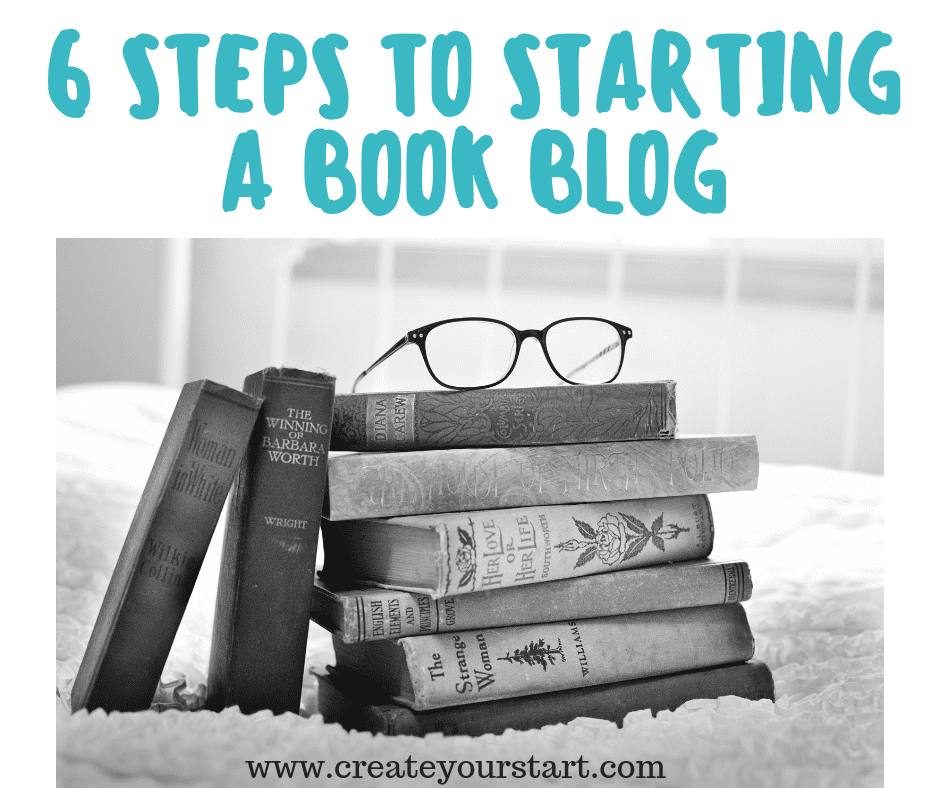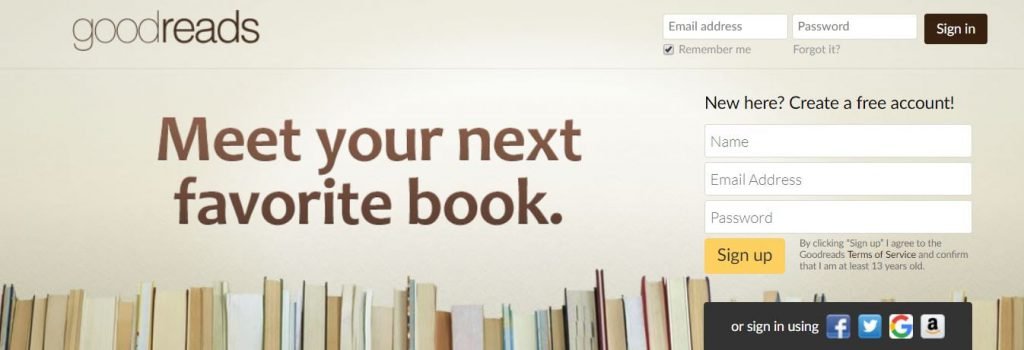
 Picture by Canva[/caption]
Picture by Canva[/caption]
Have you ever read an amazing book and really wanted to discuss it with someone? Book clubs have been around for a while and used to be the best way to share your reading passion until blogging became popular.
Starting a book blog is like reverse engineering a book club.
In an actual club, people would choose something to read and then go to meetings. This requires taking time off your day, and you don’t always have the freedom to choose what to read. A book site, on the other hand, allows you to share your thoughts on something that really inspired you. In a way, you are a reading evangelist.
Starting a site from scratch can seem like a tough job. We’re here to guide you through the six steps to launching your site.
1. Choose And Register A Domain Name
Why is it so hard to decide what to call your site? People often struggle with that because the name is crucial. Your site’s name should be clear and easy to understand.
For example, when you hear “Goodreads,” you’re not left wondering what the site is about. It’s simple and self-explanatory. This is what you should try to achieve. You would want to ensure that your site name is:
- Memorable
- Non-confusing
- Available
First, figure out these three major points. Then buy your domain name. The top providers are Namecheap, GoDaddy, and Bluehost. Get more tips on blogging tools for beginners here.
2. Get A Hosting Plan
Choosing the right hosting plan is a crucial step in starting a site. If you’re a first-timer, go for a low-cost plan that’s easy to set up. Bluehost is a great option since the setup process is simple and their customer service is top-notch. Plus, they’ll give you a free domain name!
Another hosting plan that creators go for is WPEngine. They are known for the high level of security they offer. WPEngine is a little more expensive and suitable for those with more experience.
Next, think of what content management system you’ll use. You’ve got Joomla, Drupal, Squarespace, and WordPress. Out of all four, WordPress is the easiest to navigate. Check out our Blogging tools post to learn more.
3. Pick a Niche
If you want to do well and have loyal readers, you have to choose a specific category, also known as a “niche.” Your niche often ties in with your passion. Are you passionate about fiction or non-fiction? Pick a genre you’d enjoy writing about without getting bored.
Some fiction sub-categories you can explore are sci-fi, romance, thrillers, and horror. If you prefer non-fiction, think about biographies, self-help, and business. Now to the next step, choosing a category.
Some category suggestions
Seasons
You can focus your site on seasonal holidays such as Halloween, Thanksgiving, and Christmas. Feature books related to the particular time of the year. This will help drive sales if you’re selling online.
Interests
This niche allows you to get really specific. You might feature reading that has to do with sports (tennis, basketball), sailing, cooking, singing, playing musical instruments, etc.
Themes
Explore some themes like love, war, prejudice, and self-motivation. The site Literary devices have a complete list of themes in case you need some inspiration.
Based on these categories, create a list of reading to write about each month. This is your first step to creating a content calendar which helps plan your content ahead of time. You will be much more successful as a blogger when you are strategic about your content planning.
Here’s how to create a content calendar:
- List out all the topics you want to cover in a quarter.
- Plan what you want each content piece to deliver – this is a “call to action.”
- Decide on the number of posts for each month and assign publishing date for each content.
Find tools for creating your content calendar on Co-schedule and Hubspot. Your content calendar does not only address your posts but your social media posts as well.
Ideas for a content calendar
Book reviews: This involves writing reviews about books that you’ve read.
Author Interviews: Interview authors of books that you’re featuring. If you’re able to get a video interview that will be great because it will make your posts much more engaging.
How to solve reading challenges: Many people buy books and never end up reading them. You can write posts on how to be consistent.
Bestsellers list: Choose a particular day to feature the current best sellers on your site. This can be weekly or twice a week. It all depends on your audience’s interests.
There are various bestsellers lists. The most prominent ones are Amazon’s best sellers list, the New York Times, and the Wall Street Journal.
These posts will help increase your affiliate income as they’ll inspire your readers to buy the featured suggestions. We’ll talk more about how affiliate income works later in this post.
Listicles: Make a list of book resources that your readers can use. For example “Top 10 book blogs to follow in 2018.”
Roundup posts on books you love: Repurpose content you’ve written before by creating roundup posts on books you’ve rated in the past.
Top Favorites: Write about your top favorite books of all time.
Make your posts more creative by adding video, memes, and photos. This will make the text less dense and keep readers engaged.
It’s super important to build up your content before the next step – launching the blog.
4. Launch your Book Blog
The launch phase of this type of site is perhaps the most satisfying. Why? Because you finally put out your work for the public to see. One common mistake is starting a site without launching, which is the equivalent of talking to yourself with no audience. Instead, you have to build a community around your site and attract readers.
So, how do you launch your blog?
1. Set a launch date: Pick a specific date when you want to launch your site, while there is no right or wrong date to launch your site, taking advantage of seasons will do you a lot of good.
For example, as we approach Christmas, there is an increase in the percentage of people who buy books to give as gifts, so launching a book site in this season will help you to cash in on seasonal sales.
2. Build up a content base: This could be anywhere from 10-30 posts. That is to say, have something ready for your readers. Use different media options to keep your readers engaged.
3. Create a buzz about the site on social media: Use Instagram, Facebook groups, Twitter and Goodreads to promote your new site.
4. Start an e-mail list: An e-mail list gives you a direct line of communication to your readers. You can use it to share updates, ask for opinions, or monetize your blog and sell products later on.
Find out more about e-mail lists and tools here.
5. Prepare a launch day activity: Get people talking about your launch. Run a contest or a giveaway to build excitement and generate clicks.
5. Build a Community Around your Blog
Blogging is about attracting like-minded people with a passion for literature. So, how do you find and attract these people?
Reach out to other book bloggers
Blogging is a team effort, and it’s important to connect and collaborate with people in your niche. You can offer guest posting and share each other’s content. List your site on platforms like bookbloggerlist.com and blogfeedspot.com
Join online forums for publishers and authors
This will help you meet first-time authors and publishers. Chances are, they need writers like you to get people talking about their upcoming books.
Join Facebook groups
Be strategic about this. Find specific groups for book lovers where you can share your content and engage with others by liking and commenting on their posts.
Post consistently on your blog
The difference between average and great writers is that the latter take the project seriously and are consistent. Publishing a post once a month is not enough. Therefore you will need to continuously post on your blog to keep readers engaged. Besides, consistent posting is great for SEO, and you will be rewarded with organic traffic.
Use the power of social media
As a blogger, being on social media is a must. Channels like Facebook, Twitter, Pinterest, Goodreads, and Instagram will give you an amazing reach for free.
Run giveaways and contests
To build your email list, run giveaways and contests. How do you do that? Collaborate with book authors to give free copies to those who engage with you on social media and refer friends to your blog. Authors will gain book exposure as well.
Attend book fairs, launch events, and festivals
Face to face interaction is important even though most of your contacts will be done online. Attending book launches, book fairs and literary festivals will help you make connections that will spread the word about your blog.
Create a Goodreads account
Goodreads is an online platform where passionate readers go to find what’s new on the market. Go ahead and sign up. Then post your book reviews and a link to your blog. Connect Facebook to your account to enable sharing.

Building a community around your site takes time and patience, but if you’re consistent, you’ll be able to reap financial benefits. Let’s have a look at how to make money with your site.
6. How to monetize your blog
Do you know what’s better than expressing your passion? Making money doing it. Guess what – that’s entirely possible! The first thing to do if you want to start earning cash for your writing is to take it seriously, as though it’s a real job.
Once you’ve got the mindset down, you can start earning with:
Affiliate marketing
Affiliate marketing means earning income through commissions from books and resources that you recommend to your readers.
For example, if you are featuring a book that is sold on Amazon, you make an income each time someone buys that book through the link on your site. The best part about affiliate income is that it is passive.
Selling ad space on your blog
You can sell Ad space on your blog to people who want to advertise on your Blog or sign up with Ad networks like Adsense and Media.
Starting a subscription-based Facebook book club
As you grow your community of readers, you may want to give people exclusive access to your upcoming book reviews or perhaps a new release.
Having a place where people can read and discuss the book even before others know about it could be a good income earner.
People love exclusivity and will pay for it.
Creating an e-course
If you have been successful in your efforts, creating a course could be a way to teach others how you attained success. In other words, you are offering them your experience for a fee.
Ghostwriting a book
There are people who want to write books but don’t have the time to do so. Ghostwriting for such people could be a way to make income.
Freelance writing
Offering freelance writing services to other Bloggers who want to create more content but lack the capacity to do so is another way of monetizing your blog. Freelance writers often charge per word and can make a decent income.
Check out Problogger.com, Freelancewritingjobs.com, Bloggerjobs.com for online jobs.
Selling books on your site
As part of your site, you could create an online shop where you sell books.
Conclusion
Starting a blog is a great hobby for those who love to read. While a lot of mechanics go into it, the key steps to setting your site up are simple. First choose a hosting provider, a domain name, and consequently begin publishing content. Once you’ve got that setup, create a community around your site and begin networking both online and offline.
If you take your site seriously, you can monetize it by affiliate marketing, selling ad space and books. You can also start a subscription-based club. While launching a successful site requires making an effort and being patient, it can pay off big time.
Sart your book blog today by securing a domain name and hosting plan here.


Leave a Reply